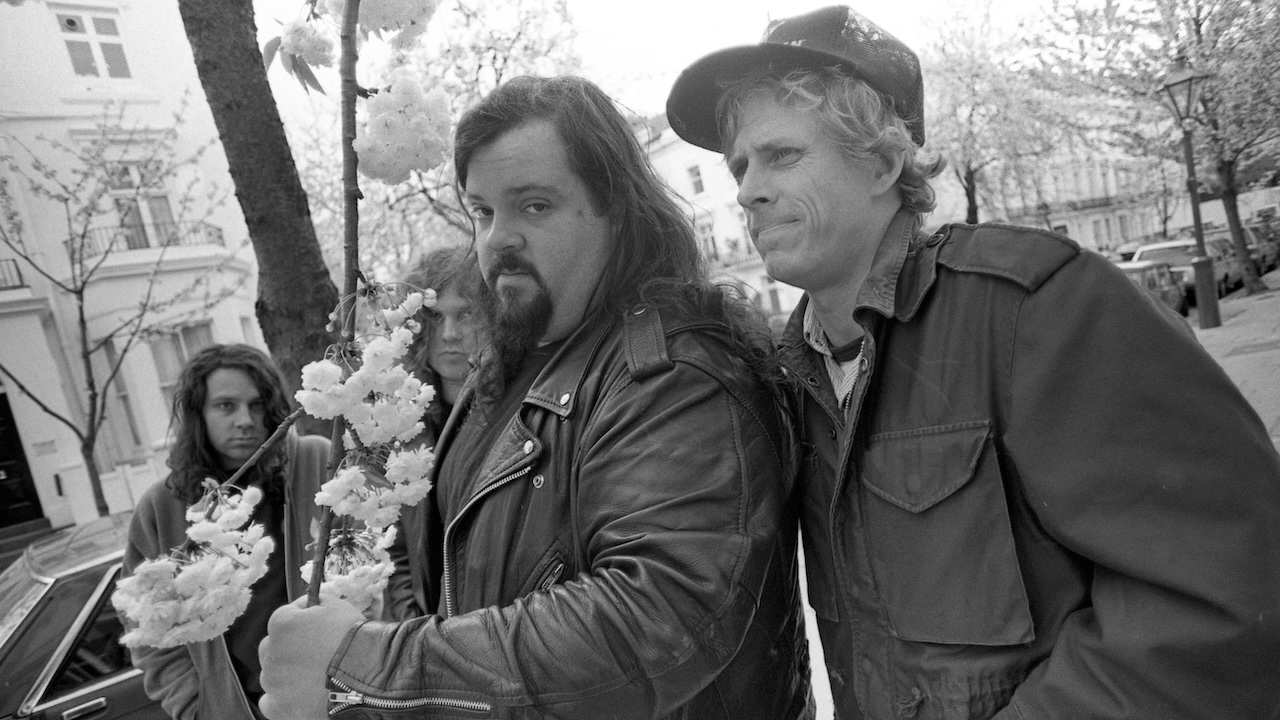Anvil: the 80s metal icons who were born to fail
Anvil’s debut album Hard ’N’ Heavy is an 80s metal classic that should have turned them into superstars. Mainman Steve ‘Lips’ Kudlow looks back on a career of missed chances

History doesn’t always get it right. While every metalhead knows that the 80s began with a flurry of classic albums from Ozzy, Priest, Maiden, Motörhead and many more, one of the most important and influential records of the decade’s first couple of years rarely gets a mention. Released in the spring of 1981, Toronto trio Anvil’s debut album, Hard ’N’ Heavy, was one of the catalysts that set metal’s wheels rolling towards the birth of thrash and beyond, influencing Metallica, Anthrax and countless more iconic bands in the process.
Today, genial frontman Steve ‘Lips’ Kudlow looks back on those early days as a time of wide-eyed enthusiasm. “When the 80s started, metal really didn’t exist, particularly in North America,” he recalls. “It was something that was mainly coming from the UK. We formed in ’78 and I guess we were kind of bringing metal to our country. We had cassette tapes that we’d run through our PA system and we’d introduce other cool bands to the audiences that we were playing for. So it was a really new thing, but to us it was just a continuation of the hard rock that we’d been listening to since we were kids. They just started to call it heavy metal and we were happy to be part of it. It was exciting, man.”
Hindsight is a glorious thing. Looking back to the music Anvil were making in the early 80s, it’s easy to see how wildly ahead of their time they were and how, along with Motörhead, they contributed several major new weapons to metal’s creative armoury. Although Hard ’N’ Heavy was a largely straightforward hard rock record, songs such as Bedroom Game and Bondage are some of the earliest ever examples of what would become speed and thrash metal.
- 100 rock and metal songs that built the 80s
- The 50 best metal albums of the last 50 years
- The Story Behind The Song: Balls To The Wall by Accept
- Every Metallica album ranked from worst to best
“Robb [Reiner, Anvil drummer] and I were always really intrigued by and loved Deep Purple a lot, and the higher- tempo stuff really attracted us and inspired us to want to be able to play like that,” Lips explains. “So in doing that, instead of single bass drum beats, Robb started using double bass drum beats and I would chug the guitar in much the same way as [Ritchie] Blackmore did on Speed King or Flight Of The Rat or any of the higher-tempo Deep Purple songs. And I guess that became speed metal, but we didn’t know that’s what we were doing! That’s just what it became.”
Recorded at Quest Studios in Oshawa, Canada, Anvil’s debut album was entirely self-financed, not least because the North American music industry was yet to pick up on this new and exhilarating breed of none-more-heavy rock. As Lips notes, the songs on Hard ’N’ Heavy were written very early on in Anvil’s development as musicians and songwriters, and it wouldn’t be until 1982’s Metal On Metal that the band’s more brutal ideas started to gain traction.
“Realistically, the material that was written for that first record was written two to three years before it was recorded. So it’s really previous to metal even being called metal, if you know what I mean. What were we influenced by? Obviously English stuff and also American stuff. Bedroom Game was directly influenced by Rainbow. Then there’s Bondage, which was directly influenced by Ted Nugent. So it’s really all that stuff that was part of the 70s. It just so happened that we didn’t release it until 1981. As soon as that came out, we started writing for the second record, which came out in 1982. Metal On Metal was much more of a heavy metal record than the first one.”
Hard ’N’ Heavy was released on May 25, 1981 via Canadian rock imprint Attic Records. Lips notes that securing a record deal hadn’t been too much of a problem, but that at least one prospective benefactor at Capitol Records had flinched when confronted with the sexually charged (but slightly juvenile) lyrics to songs like School Love, I Want You Both (With Me) and, in particular, Bondage (opening line: ‘Tie me down you mean old bag!’). Lips cackles at the memory.
Sign up below to get the latest from Metal Hammer, plus exclusive special offers, direct to your inbox!
“Anybody between the ages of 18 and 23, that’s all that’s on your mind, right?” he muses, not unreasonably. “That guy hears School Love and he says, ‘Oh my god, that’s absolutely filthy! We’re not signing that!’ Ha ha! So it makes sense that the first album was so much about sex. The second one made a slight departure from that, because I guess it became a little less important. Maybe my hormones weren’t working as strongly, I don’t know! Ha ha ha!”
If you’ve seen Sacha Gervasi’s astonishing documentary, Anvil: The Story Of Anvil (and if you haven’t, what the fuck?) then you will know that Lips’ hopes for world domination never quite came to fruition. Despite his and Robb Reiner’s resolute determination, an initial flurry of low-key success in the early 80s never led them to a major commercial breakthrough, and due to poor management decisions and a whole stack of bad luck, the 80s didn’t turn out to be golden age that Anvil unquestionably deserved. In fact, it all sounds a bit rank.
“Getting the first album recorded was a massive highlight,” Lips states. “But I don’t look back at the 80s with great nostalgia. I’ll be honest, I’ve had better times! Ha ha! Some of those days were pretty rough. Some of the hotel rooms were horrible. There were holes in the walls. You had to bring sleeping bags, because if you slept in those beds you were gonna get scabies and fuckin’ crabs. If you slept with anyone you’re gonna get a dose. It was just a dirty time and a dirty environment, so yeah, we had a lot of fun but there was some pretty awful stuff going on.”
In musical terms, Anvil plainly made their mark in those grubby early days. Glowing tributes from the likes of Lars Ulrich and Anthrax’s Scott Ian at the start of Anvil: The Story Of Anvil tell their own story about the lasting impact and power of Lips’ prescient contribution to metal history, even if the band themselves are underdogs to the last and proud of it.
“When you’re ahead of your time, it’s a real problem,” he shrugs. “You can have something extremely unique and cutting edge and you send that to a record label, and they won’t sign it because they don’t understand it. But I knew what we had was special, even back on Hard ’N’ Heavy. I was never going to give up and now I’ve been doing it for 40 years nonstop. And we are still playing School Love!”

Even as Lips bemoans the struggles that his band had to endure during their pioneering early days, he still sounds very much in love with the whole notion of playing in a heavy metal band. He’s also happy to admit that it was Sacha Gervasi’s support and the impact of his documentary that finally, after 30 years of trying, enabled Anvil to become the secure recording and touring unit that they always wanted to be.
“We fell between the cracks and that’s what caused the fall into obscurity,” he notes, cheerfully. “But it never put an end to what I wanted to do. I just waited until it came around again. In the end, a kid that we met back at The Marquee in London grew up to be Steven Spielberg’s screenwriter, and what does he do? He makes a movie about Anvil and that’s it, bingo! Had I given up in ’83, there would’ve been no history for that movie to base itself on. So you can’t wish anything different.”
Despite the 40th anniversary of their debut’s release looming in 2021, Lips and his band have absolutely no intention of wallowing in nostalgia. Their 2020 album Legal At Last upheld their mighty legacy. True to form, it failed to set the world on fire. But then Lips long ago gave up on that dream.
“We don’t want to be playing at Glastonbury, 100 feet from the nearest hand,” he says. “I want to be right there, up close and personal. I want everyone to say that they were really in the same room, at the same place and time as Anvil. That’s the magic. I want to be the biggest club band that ever existed and then I can walk away saying that I’ve really done what I wanted to do. It’s been a long haul, but it’s better than having a day job, trust me! Ha ha ha!”
Published in Metal Hammer #332

Dom Lawson began his inauspicious career as a music journalist in 1999. He wrote for Kerrang! for seven years, before moving to Metal Hammer and Prog Magazine in 2007. His primary interests are heavy metal, progressive rock, coffee, snooker and despair. He is politically homeless and has an excellent beard.
